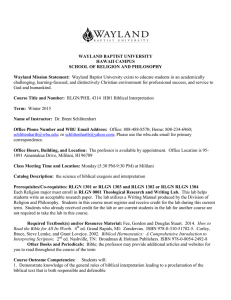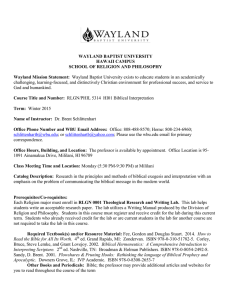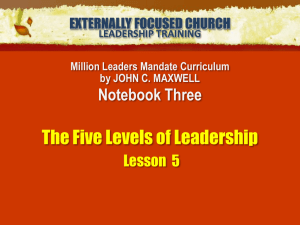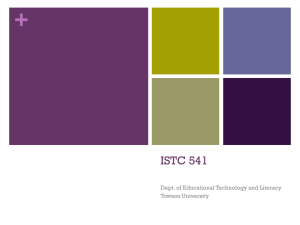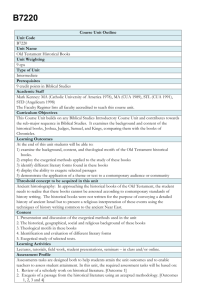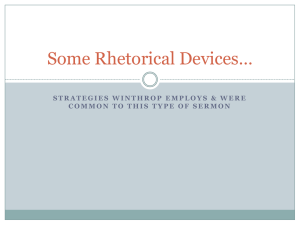Biblical Interpretation - Wayland Baptist University
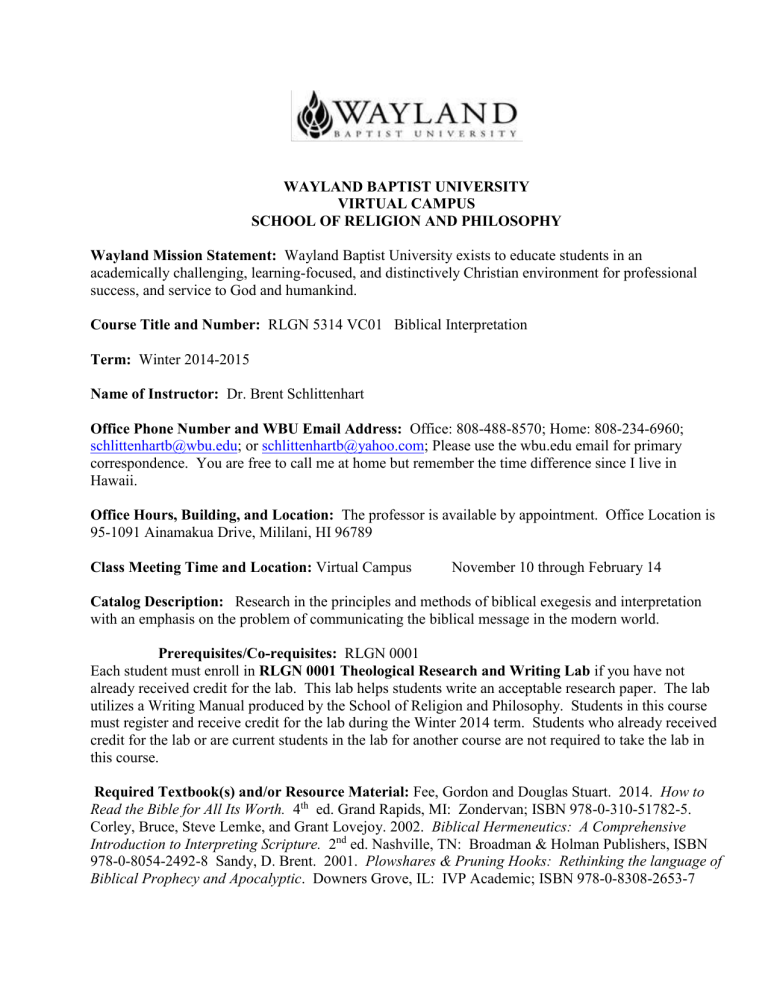
WAYLAND BAPTIST UNIVERSITY
VIRTUAL CAMPUS
SCHOOL OF RELIGION AND PHILOSOPHY
Wayland Mission Statement: Wayland Baptist University exists to educate students in an academically challenging, learning-focused, and distinctively Christian environment for professional success, and service to God and humankind.
Course Title and Number: RLGN 5314 VC01 Biblical Interpretation
Term: Winter 2014-2015
Name of Instructor: Dr. Brent Schlittenhart
Office Phone Number and WBU Email Address: Office: 808-488-8570; Home: 808-234-6960; schlittenhartb@wbu.edu
; or schlittenhartb@yahoo.com
; Please use the wbu.edu email for primary correspondence. You are free to call me at home but remember the time difference since I live in
Hawaii.
Office Hours, Building, and Location: The professor is available by appointment. Office Location is
95-1091 Ainamakua Drive, Mililani, HI 96789
Class Meeting Time and Location: Virtual Campus November 10 through February 14
Catalog Description: Research in the principles and methods of biblical exegesis and interpretation with an emphasis on the problem of communicating the biblical message in the modern world.
Prerequisites/Co-requisites: RLGN 0001
Each student must enroll in RLGN 0001 Theological Research and Writing Lab if you have not already received credit for the lab. This lab helps students write an acceptable research paper. The lab utilizes a Writing Manual produced by the School of Religion and Philosophy. Students in this course must register and receive credit for the lab during the Winter 2014 term. Students who already received credit for the lab or are current students in the lab for another course are not required to take the lab in this course.
Required Textbook(s) and/or Resource Material: Fee, Gordon and Douglas Stuart. 2014. How to
Read the Bible for All Its Worth.
4 th
ed. Grand Rapids, MI: Zondervan; ISBN 978-0-310-51782-5.
Corley, Bruce, Steve Lemke, and Grant Lovejoy. 2002. Biblical Hermeneutics: A Comprehensive
Introduction to Interpreting Scripture.
2 nd
ed. Nashville, TN: Broadman & Holman Publishers, ISBN
978-0-8054-2492-8 Sandy, D. Brent. 2001. Plowshares & Pruning Hooks: Rethinking the language of
Biblical Prophecy and Apocalyptic . Downers Grove, IL: IVP Academic; ISBN 978-0-8308-2653-7
The professor will provide additional word documents and possible articles and websites posted on
Blackboard for you to read throughout the course of the term.
Course Outcome Competencies: Students will:
1. Demonstrate knowledge of the general rules of biblical interpretation leading to a proclamation of the biblical text that is both responsible and defensible
2. Demonstrate knowledge of the history of interpretation and the effect on biblical interpretation
3. Demonstrate knowledge of the genres of the biblical text, tools used in interpretation, and scholarly criticism necessary for responsible exegesis of the biblical text
4. Explain the nature and authority of biblical literature and the need for interpretation
5. Describe the task of the biblical interpreter
6. Understand and apply the principles and methods of biblical interpretation
7. Organize research and interpretation of biblical passages into an exegetical paper
Attendance Requirements: Online Attendance Policy
Online Students: Students are expected to participate in all required instructional activities in their courses. Online courses are no different in this regard; however, participation must be defined in a different manner. Student “attendance” in an online course is defined as active participation in the course as described in the course syllabus. Instructors in online courses are responsible for providing students with clear instructions for how they are required to participate in the course. Additionally, instructors are responsible for incorporating specific instructional activities within their course and will, at a minimum, have weekly mechanisms for documenting student participation. These mechanisms may include, but are not limited to, participating in a weekly discussion board, submitting/completing assignments in Blackboard, or communicating with the instructor. Students aware of necessary absences must inform the professor with as much advance notice as possible in order to make appropriate arrangements. Any student absent 25 percent or more of the online course, i.e., non-participatory during
3 or more weeks of an 11 week term, may receive an F for that course. Instructors may also file a Report of Unsatisfactory Progress for students with excessive non-participation. Any student who has not actively participated in an online class prior to the census date for any given term is considered a “noshow” and will be administratively withdrawn from the class without record. To be counted as actively participating, it is not sufficient to log in and view the course. The student must be submitting work as described in the course syllabus. Additional attendance and participation policies for each course, as defined by the instructor in the course syllabus, are considered a part of the university’s attendance policy.
Students are expected and required to meet deadlines. You are personally accountable for anticipating unforeseen delays.
Disability Statement: In compliance with the Americans with Disabilities Act of 1990 (ADA), it is the policy of Wayland Baptist University that no otherwise qualified person with a disability be excluded from participation in, be denied the benefits of, or be subject to discrimination under any educational program or activity in the university. The Coordinator of Counseling Services serves as the coordinator of students with a disability and should be contacted concerning accommodation
requests at (806) 291- 3765. Documentation of a disability must accompany any request for accommodations.”
Course Requirements and Grading Criteria:
1. Each student will read the assigned readings in the textbooks, other posted readings, and the lecture notes.
2. A discussion board will be set up on Blackboard for students to post thoughtful and reflective ( 175 minimum words) responses to various questions. This assignment is called the Student Posting on the course outline and calendar. Students must submit their Student Posting by 11:59 P.M. on Sunday.
Students will need to read everyone’s postings and respond to at least one
Student Posting each week that a Student Response is due. This assignment is called the Student Response on the course outline and calendar. The Student Response ( 125 minimum words) is due by 11:59 P.M. on Sunday but the dialogue, and therefore the grade, will be better if students submit their responses earlier in the week.
Your Discussion Board grade will be higher if you interact with more students throughout the week with other responses that do not have to meet the minimum word requirement. Your response should be thoughtful and advance the dialogue. Just saying “I agree or disagree with your comment” or an “I think the same” to someone else’s thoughts will not be considered an adequate response. I expect that there will be different views and disagreements and some of these differences will be passionate. However, students must respect each other and express their disagreements in a manner that is civil and honorable.
The professor will not tolerate personal attacks on other students and their views. We need to disagree in ways that are respectful of each other. I will give one grade for each discussion board forum. The grade will include both your student posting and your student responses, so make sure that you do an adequate job on both parts of the discussion board.
3. Each student will submit a Blog Entry (200 minimum words) on designated weeks in the course outline and calendar highlighting significant points that stand out through the lecture notes or the reading assignments for that week. Students need to read each other’s blogs and are welcome to make comments. The blog entry is due at 11:59 P.M. on Sunday.
The Student Postings, Student Responses, and the Blog Entries promote discussion and dialogue and therefore enhance the learning experiences of the students. The blog entries are opportunities for students to point out and discuss other things in the lecture notes and readings that the professor has not asked about in the Discussion Board.
4. Each student will take a midterm and a final exam. The exam may cover all reading assignments and lecture material. The professor will provide a study guide near the end of the term. The exam will be given on Blackboard and the student will have most of the week to take the exam, however, once the exam is started there will be a time limit for answering the questions. No notes or texts can be used by the student while taking the exam.
5. Each student will write an exegetical paper from either an Old Testament or New Testament passage that he or she chooses. The exegetical paper needs to make clear the historical meaning of the passage for its original audience in addition to applying the historical meaning of the text for the lives of contemporary Christian believers. The paper should employ the elements suggested in the Corley text book on pages 9—19 as the student works on the paper.
The paper needs to follow the Turabian format by using the WBU Religion Writing Lab Style Guide in form and documentation and use footnotes in the paper The paper needs to include a title page, table of contents, and a bibliography in addition to the 8 to 15 pages of text and requires a minimum of fifteen sources. Margins for the paper need to conform to the writing lab style guide, use 10 or 12 New Times Roman font, and double space.
The professor will grade the paper according to the rubric posted on Blackboard. The student needs to submit the finished paper to the professor through email and safe assignment. The best way to do this is
in order to keep the formatting correct is to make four separate word documents (one for the title page; 1 for the table of contents; 1 for the body of the paper, and 1 for the bibliography) and attach them to an email that you send to the professor. The body of the paper needs to be submitted through safe assignment in Blackboard.
6. Each student will write a 6 to 10 page critical book review of Plowshares & Pruning Hooks . The book review needs to have a title page, an analysis and evaluation of the book’s contents highlighting the strengths and weaknesses of the book. Quotations from the book in the review can be referenced parenthetically with just the page number. The student can use book reviews from journal articles to assist in the analysis and evaluation of the book as long as they are properly documented and footnoted and then included in a bibliography page.
7. Each student will participate in group work on selected passages in a variety of genres during the term. The professor will assign the groups and the passages during the term and provide resources over the passages. The groups will apply the rules of that genre as they work on the interpretation of the passage. You do not have to be online at the same time to work together because a Discussion Board and Blog will be setup within the groups so that you can carry on conversations with each other in the group as you collaborate on an interpretation of the passage. The groups will then submit the interpretation for the rest of the class in a Wiki page by the deadline of the assignment so that everyone in the class can benefit from the groups work. The professor will provide more information and details through Blackboard on the passages, the grading of the student’s participation in the group, and the submission of the work to the rest of the class.
Resources:
The student can request many resources through the WBU main campus library and have them mailed directly to his/her home at no cost to the student. While you will be using the Bible, it does not count as one of your minimum resources, however, when referencing a verse from the Bible follow the directions in the Writing Lab Manual and when referencing a study note from the NIV Study Bible use the form for one general editor. START YOUR RESEARCH EARLY!
All time deadlines correspond to the Central Time Zone in Plainview, TX. The assignments are due at 11:59 PM on the Due Date.
Course Evaluation:
University Grading System
A 90-100
B
C
D
F
80-89
70-79
60-69
BELOW 60
I
Cr
INCOMPLETE**
FOR CREDIT
NCr NO CREDIT
WP WITHDRAWAL PASSING
WF WITHDRAWAL FAILING
W WITHDRAWAL
** A grade of incomplete is changed if the work required is completed prior to the last day of the next long (10-15 weeks) term, unless the instructor designates an earlier date for completion. If the work is not completed by the appropriate date, the I is converted to a grade of F. An incomplete notation cannot remain on the student’s permanent record and must be replaced by the qualitative grade (A-F) by the date specified in the official University calendar of the next regular term. An incomplete turned to a qualitative grade will be indicated by the notation I/grade on the student transcript.
Procedure for computations of final grade
1. Exegetical Paper:
2. Midterm Exam:
20%
20%
3. Final exam:
4. Discussion Board Average
5. Blog Average
6. Group Work on Passages
20%
10%
10%
10%
7. Critical Book Review 10%
Late assignments will not receive full credit and will usually receive a five point minimum reduction.
Students shall have protection through orderly procedures against prejudices or capricious academic evaluation. A student who believes that he or she has not been held to realistic academic standards, just evaluation procedures, or appropriate grading, may appeal the final grade given in the course by using the student grade appeal process described in the Academic Catalog. Appeals may not be made for advanced placement examinations or course bypass examinations. Appeals are limited to the final course grade, which may be upheld, raised, or lowered at any stage of the appeal process. Any recommendation to lower a course grade must be submitted through the Executive Vice
President/Provost to the Faculty Assembly Grade Appeals Committee for review and approval. The
Faculty Assembly Grade Appeals Committee may instruct that the course grade be upheld, raised, or lowered to a more proper evaluation.
Tentative Schedule: Course Outline and Calendar
Week 1 11/10—11/16/2014 Preliminary definitions; the inspiration and authority of the Bible and why it needs interpretation; barriers to interpretation, general hermeneutical principles, and tools for interpretation
Reading Fee 8-56; 275-290; Corley 2-53; 176-241; 433-473
Student Posting 1 and Blog 1 due 11/16
Week 2 11/17—11/23/2014 Interpreting the Epistles
Reading: Fee 57-92; Corley 331-346; 356-386
Student Response 1 and Group Work 1 due 11/23
11/24—11/30/2014 Thanksgiving Break
Week 3 12/01—12/07/2014 Interpreting Old Testament Narratives
Reading: Fee 93-111; Corley 260-279; 398-431
Student Posting 2 and Group Work 2 due 12/07
Week 4 12/08—12/14/2014 Interpreting Acts and a Brief History of Interpreting the Bible
Reading: Fee 112-131; Corley 328-329; 56-130
Student Response 2 and Blog 2 due 12/14
Week 5 12/15—12/21/2014 Modern History of Interpreting the Bible
Reading: Corley 131-174; 387-397
Blog 3 and Midterm Exam due 12/21/2014
12/22/2014—01/04/2015 Christmas Break
Week 6 01/05—01/11/2015 Interpreting the Gospels and Parables
Reading : Fee 132-167; Corley 316-328
Student Posting 3 and Group Work 3 due 01/11
Week 7 01/12—01/18/2015 Interpreting the Law
Reading: Fee 168-186; Corley 244-259
Student Response 3 and Blog 4 due 01/18
Week 8 01/19—01/25/2015 Interpreting the Prophets
Reading: Fee 187-211; Corley 301-315
Blog 5 and Group Work 4 due 01/25
Week 9 01/26—02/01/2015 Interpreting the Psalms and Wisdom Literature
Reading: Fee 212-257; Corley 280-300
Student Posting 4 and Critical Book Review due on 02/01
Week 10 02/02—02/08/2015 Interpreting the Apocalyptic
Reading: Fee 258-273; Corley 347-354
Student Response 4, Blog 6 and Exegetical Paper Due 02/08
Week 11 02/09—02/14/2015
Additional Information:
Final Exam due on Saturday 02/14
Academic Honesty (Plagiarism): University students are expected to conduct themselves according to the highest standards of academic honesty. Academic misconduct for which a student is subject to penalty includes all forms of cheating, such as illicit possession of examinations or examination materials, forgery, or plagiarism. (Plagiarism is the presentation of the work of another as one’s own work.) It is the student’s responsibility to be familiar with penalties associated with plagiarism stated in the catalog.
Method of Instruction: Online through Blackboard and the Virtual Campus
Internet Access
All Virtual Campus students are required to have access to the Internet, an e-mail account, and access to a computer with Microsoft word processing capability. All information exchanges, homework assignments, exams, and other requirements for this course will be conducted via Wayland Baptist
University’s Blackboard, e-mail/email attachment(s). Use of anti-virus software for computer is highly recommended. If you have not activated your Wayland email account this is a good time to do so.
Important announcements and other information can be emailed to your Wayland account directly from
Blackboard.
